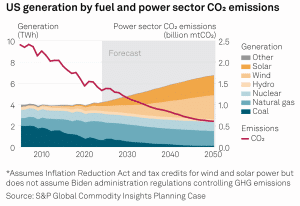As the 2024 US presidential election approaches, the future of the Biden-Harris administration’s ambitious climate and energy regulations stands at a critical juncture. This election could significantly influence the direction of US energy policy and climate action. It can also potentially shape the nation’s environmental landscape for years to come.
Biden-Harris Administration’s Climate Legacy
The Biden administration has made significant strides in advancing climate and energy policies, with the Inflation Reduction Act (IRA) being a cornerstone of its strategy. Passed in August 2022, the IRA represents a historic $370 billion investment in clean energy and climate initiatives. This landmark legislation can incentivize clean energy production and reduce greenhouse gas (GHG) emissions across various sectors.
Key provisions of the IRA include:
- Clean Energy Production Tax Credits: These credits aim to support the generation of renewable energy from sources like wind, solar, and geothermal.
- Investment Tax Credits: These credits are available for investments in renewable energy infrastructure, encouraging the growth of clean energy technologies.
- Federal Tax Credit for Electric Vehicles: The IRA offers a $7,500 tax credit for the purchase of new electric vehicles (EVs). The incentive’s goal is to promote the adoption of cleaner transportation options.
These tax credits are central to the Biden administration’s efforts to cut emissions from the electricity sector, transportation, and oil and gas industries. The administration has set ambitious emissions reduction goals, including reducing GHG emissions by 50-52% below 2005 levels by 2030. However, the path to achieving these goals has been fraught with challenges.

Despite these efforts, many of the administration’s new regulations face significant legal scrutiny, including:
- Carbon Capture Requirements: In April 2024, the Environmental Protection Agency (EPA) finalized a rule mandating 90% carbon capture at existing coal-fired power plants by 2032. This regulation aims to mitigate emissions from one of the largest sources of industrial pollution.
- Fuel Economy Standards: In June 2024, the US Department of Transportation published final fuel economy standards that require new cars and light-duty trucks to achieve a fleetwide average of 50.4 miles per gallon (mpg) by 2031. This measure is intended to improve fuel efficiency and reduce emissions from the transportation sector.
These regulations are currently undergoing litigation, and their future remains uncertain. The administration has worked to finalize many of these rules before potential Congressional Review Act (CRA) deadlines, which could allow Congress to overturn recent regulations. However, these rules are still vulnerable to challenges in court, particularly from conservative judges.
Trump’s Deregulatory Agenda
Former President Donald Trump’s campaign is promising a significant shift in energy policy if he returns to office. Trump’s platform centers on a deregulatory approach to energy, focusing on “energy dominance” by supporting traditional fossil fuels such as coal, oil, and natural gas.
Key aspects of Trump’s proposed agenda include:
- Dismantling Biden-Era Regulations: Trump aims to roll back many of the climate regulations implemented by the Biden administration. This includes repealing emissions-cutting rules and undoing incentives for clean energy.
- Re-Exit from the Paris Agreement: Trump has indicated a desire to withdraw the US from the Paris Agreement on climate change, reversing the Biden administration’s commitment to international climate goals.
- Boosting Oil and Gas Leasing: Trump plans to expand oil and gas leasing on public lands and offshore areas, which could increase fossil fuel production and emissions.
Trump’s approach would likely involve issuing executive orders on his first day in office to reverse Biden-era climate policies. According to legal experts, this could include revoking environmental regulations related to carbon emissions, fuel economy, and clean energy. It may also involve restarting or accelerating fossil fuel projects, such as oil drilling in Alaska and expanding natural gas exports.
Trump’s team has signaled that he would act swiftly to implement these changes. David Bernhardt, former Interior Secretary under Trump, has stated that:
“On Day One, President Trump will rescind every one of Joe Biden’s industry-killing, job-killing, pro-China and anti-American electricity regulations.”
The Impact on U.S. Emissions Reduction Goal
The statement aligns with recommendations in Project 2025, a 900-page deregulatory policy blueprint released by the conservative Heritage Foundation. The plan anticipates a future Republican administration and outlines strategies to dismantle current climate policies. Although Trump has tried to distance himself from the plan, its recommendations reflect his campaign’s direction.
Energy Innovation, a nonpartisan energy and climate policy firm, estimated that fully implementing Project 2025 would cause the US to fall 27% points short of its Paris Agreement goal.
The latest update from S&P Global Commodity Insights’ North American Power Market Outlook Planning Case anticipates a 52% reduction in US power-sector carbon emissions from 2005 levels by 2030. This projection is driven by clean energy tax credits in the Inflation Reduction Act. However, the planning case does not factor in the EPA’s recently finalized GHG regulations, which face legal vulnerabilities.
Some Biden administration rules may be at risk of early Congressional Review Act disapproval if Republicans gain control of the White House and Congress. The Congressional Research Service estimates that rules finalized on or after August 1 could be subject to disapproval resolutions.
Industry and Environmental Reactions
The energy sector is bracing for potential upheaval, with regulatory uncertainty high. Industry groups are preparing for the possibility of regulatory changes depending on the election outcome.
Environmental advocates are also mobilizing to defend Biden-era policies if Trump wins. Chris Espinosa of Earthjustice has emphasized the commitment to defending progress on climate regulations against any rollback attempts.
Remarkably, several climate-focused organizations have united to launch a $55 million advertising campaign in support of Vice President Kamala Harris. The coalition aims to highlight how green initiatives, championed by the Biden-Harris administration, offer long-term economic growth, job creation, and innovation opportunities.
The 2024 presidential election represents a crucial moment for US climate and energy policy. The outcome will determine whether the ambitious goals set by the Biden administration continue or if a shift towards deregulation and increased fossil fuel production takes place.


